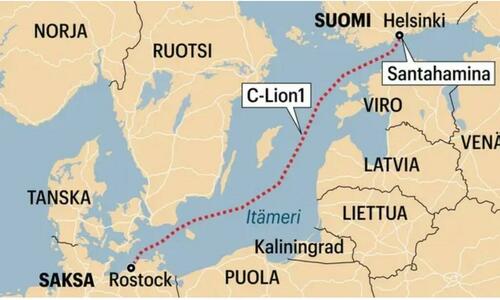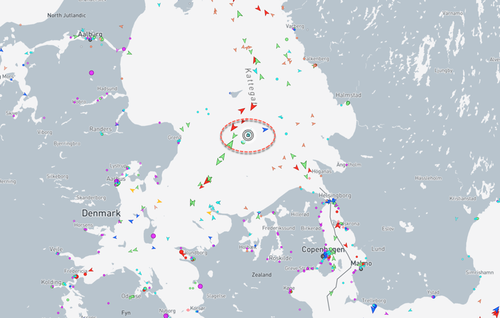A flotilla of NATO warships has surrounded a Chinese bulk carrier transporting Russian fertilizer for one week amid suspicions of its involvement in sabotaging two undersea fiber optic cables connecting Finland, Germany, Sweden, and Lithuania across the Baltic Sea.
According to The Wall Street Journal, the 225-meter Yi Peng 3 bulk carrier is at the center of the sabotage investigation and threatens to push the limits of maritime law after investigators believe the ship deliberately drug its anchor along the Baltic seabed for more than 100 miles.
Chinese Ship Suspected of Deliberately Dragging Anchor for 100 Miles to Cut Baltic Cables: WSJ
— zerohedge (@zerohedge) November 27, 2024
NATO warships surround Yi Peng 3, a Chinese bulk carrier at the center of an international probe into suspected sabotage: WSJ
Yi Peng 3 departed from the Russian Baltic port of Ust-Luga on Nov. 15. Investigators have shifted focus on whether Russian intelligence officials influenced the captain of the Chinese-owned ship to carry out sabotage on Europe's critical infrastructure.
One senior European investigator said, "It's extremely unlikely that the captain would not have noticed that his ship dropped and dragged its anchor, losing speed for hours and cutting cables on the way."
The ship tracking website MarineTraffic shows four NATO ships have surrounded the bulk carrier in the Kattegat Strait.
We first reported the incident in the early morning hours of Nov. 17, in a note titled "Fault" Strikes Undersea Fiber Cable In Baltic Sea Connecting Finland & Germany. Days later, we reported Danish Navy Hunts Down Chinese Ship Suspected Of 'Sabotaging' Baltic Sea Cables.
Two critical undersea fibre optic #cables in the #BalticSea—linking Sweden to Lithuania and Finland to Germany—were severed on November 17th and 18th, raising serious security concerns. The Chinese-flagged bulk carrier YI PENG 3 is suspended for its potential involvement.… pic.twitter.com/XRikzko8Pw
— MarineTraffic (@MarineTraffic) November 20, 2024
WSJ noted during the incident, "The ship's transponder, which charts its movements on the so-called Automatic Identification System, shut down in what is known as a "dark incident"... and the "ship then continued even as the dragging anchor greatly reduced its speed, according to satellite and other data reviewed by investigators."
"Given the mild weather conditions and manageable wave heights, the likelihood of accidental anchor dragging appears minimal," analytics company Kpler wrote in a report to WSJ.
Western intelligence officials don't believe Beijing was involved in the incident. Instead, they suspect Russian intelligence agencies...
In response to the incident, the Kremlin press office told the Journal, "These are absurd, unsubstantiated accusations."
More about the ongoing investigation from WSJ:
Under international maritime law, NATO ships can't force the Yi Peng 3 to sail into one of their ports. Swedish and German authorities are negotiating with the ship's owner to obtain access to the vessel and question its crew.
German police also dispatched the Bamberg, a patrol vessel, to investigate one of the incidents with underwater drones. Swedish and Danish ships have also examined the sites on the seabed.
European authorities must tread carefully because of their commitment to the freedom of navigation and upholding international law that underpins global trade, according to several European politicians, as well as security and law-enforcement officials familiar with the probe.
The incident in the Baltics comes just over a year after a Chinese-registered commercial vessel, the Newnew Polar Bear, severed the Balticconnector gas pipeline and fiber optic lines connecting Finland and Estonia with its anchor.
A flotilla of NATO warships has surrounded a Chinese bulk carrier transporting Russian fertilizer for one week amid suspicions of its involvement in sabotaging two undersea fiber optic cables connecting Finland, Germany, Sweden, and Lithuania across the Baltic Sea.
According to The Wall Street Journal, the 225-meter Yi Peng 3 bulk carrier is at the center of the sabotage investigation and threatens to push the limits of maritime law after investigators believe the ship deliberately drug its anchor along the Baltic seabed for more than 100 miles.
Chinese Ship Suspected of Deliberately Dragging Anchor for 100 Miles to Cut Baltic Cables: WSJ
— zerohedge (@zerohedge) November 27, 2024
NATO warships surround Yi Peng 3, a Chinese bulk carrier at the center of an international probe into suspected sabotage: WSJ
Yi Peng 3 departed from the Russian Baltic port of Ust-Luga on Nov. 15. Investigators have shifted focus on whether Russian intelligence officials influenced the captain of the Chinese-owned ship to carry out sabotage on Europe's critical infrastructure.
One senior European investigator said, "It's extremely unlikely that the captain would not have noticed that his ship dropped and dragged its anchor, losing speed for hours and cutting cables on the way."
The ship tracking website MarineTraffic shows four NATO ships have surrounded the bulk carrier in the Kattegat Strait.
We first reported the incident in the early morning hours of Nov. 17, in a note titled "Fault" Strikes Undersea Fiber Cable In Baltic Sea Connecting Finland & Germany. Days later, we reported Danish Navy Hunts Down Chinese Ship Suspected Of 'Sabotaging' Baltic Sea Cables.
Two critical undersea fibre optic #cables in the #BalticSea—linking Sweden to Lithuania and Finland to Germany—were severed on November 17th and 18th, raising serious security concerns. The Chinese-flagged bulk carrier YI PENG 3 is suspended for its potential involvement.… pic.twitter.com/XRikzko8Pw
— MarineTraffic (@MarineTraffic) November 20, 2024
WSJ noted during the incident, "The ship's transponder, which charts its movements on the so-called Automatic Identification System, shut down in what is known as a "dark incident"... and the "ship then continued even as the dragging anchor greatly reduced its speed, according to satellite and other data reviewed by investigators."
"Given the mild weather conditions and manageable wave heights, the likelihood of accidental anchor dragging appears minimal," analytics company Kpler wrote in a report to WSJ.
Western intelligence officials don't believe Beijing was involved in the incident. Instead, they suspect Russian intelligence agencies...
In response to the incident, the Kremlin press office told the Journal, "These are absurd, unsubstantiated accusations."
More about the ongoing investigation from WSJ:
Under international maritime law, NATO ships can't force the Yi Peng 3 to sail into one of their ports. Swedish and German authorities are negotiating with the ship's owner to obtain access to the vessel and question its crew.
German police also dispatched the Bamberg, a patrol vessel, to investigate one of the incidents with underwater drones. Swedish and Danish ships have also examined the sites on the seabed.
European authorities must tread carefully because of their commitment to the freedom of navigation and upholding international law that underpins global trade, according to several European politicians, as well as security and law-enforcement officials familiar with the probe.
The incident in the Baltics comes just over a year after a Chinese-registered commercial vessel, the Newnew Polar Bear, severed the Balticconnector gas pipeline and fiber optic lines connecting Finland and Estonia with its anchor.


